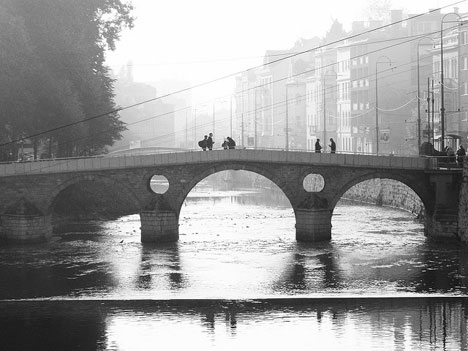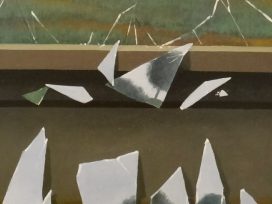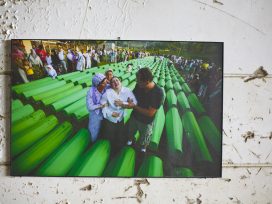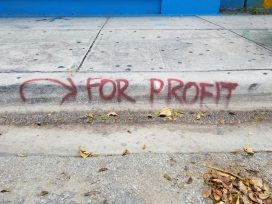I feel anxious with April approaching. It was 24 years ago that the four-year siege of Sarajevo began. By then, Serbia had already used the Yugoslav Army to attack Slovenia and Croatia, but we in Sarajevo could not believe that war was possible in Bosnia and Herzegovina, and especially in our city. We believed that Sarajevo was immune to nationalism: the only thing that the citizens of Sarajevo considered worse than being a nationalist was to be a homosexual. According to statistics, every third marriage in Sarajevo was ethnically mixed. How then was it possible to have a war between the Serbs, Croats and Bosniaks living in the city? My best friend was Mladen, we worked together for the most popular radio station in Yugoslavia, and even after years of friendship I did not know whether he was a Serb or a Croat.
That is exactly what my relatives thought – my relatives, who lived in the heart of Sarajevo, right above the old part of the city and near the place from which, on 28 June 1914, the young Serb patriot Gavrilo Princip assassinated the heir to the Austrian throne, Archduke Franz Ferdinand, and his wife Sofia – the act used as the pretext for beginning World War I. On that spring day in 1992, my cousins were preparing for Sunday lunch. The youngest of them, Nadir, went to the nearby bakery to buy some bread. Soon after he left the building, there came the roar of an artillery shell exploding outside. His parents and sister would never again see the sixteen-year-old Nadir alive: on the way to hospital he bled to death, wounded by pieces of shrapnel from the shell that Serb forces on the hills surrounding Sarajevo fired at the city centre. Soon, I arrived at the flat of Nadir’s parents. They assigned me the duty of answering phone calls from Nadir’s school friends. Handsome as he was, and always smiling, Nadir was popular among his friends. They heard that he had been wounded and I was the one who had to tell them that Nadir had died on the way to hospital.

Latin Bridge, Sarajevo, November 2015. Site of the assassination of Archduke Franz Ferdinand of Austria and his wife Sofia. Photo: sundeviljeff. Source: Flickr
For me, this marked the beginning of war in Bosnia and Herzegovina. For almost four years, day in, day out, I witnessed the horrendous suffering of the civilians of Sarajevo targeted by Serb artillery and snipers: they killed almost 12,000 citizens, among them over 1,500 children, and wounded more than 50,000. I hated Chetniks, as we used to call the Serb Army on the hills around Sarajevo; I hated them more than anyone in the world. Every day, civilians, women and children were getting killed around me in the city deprived of water, electricity, heating and food. I consider myself an agnostic, but I have made a private agreement with God: to protect me so that I do not become a disabled person, or end up alive in the hands of Chetniks, while, in return, I will do as many good deeds as I can. I did not ask Him to make sure that I survive; death was not so bad since it was around me at every moment and its proximity was what in some perverted way gave meaning to life – meaning that I would never grasp again.
My parents and my sister shared the destiny of millions of refugees from the former Yugoslavia affected by the war. Due to their ethnic and religious background, they had to flee Montenegro, where they had lived. All connections were disrupted so we did not have any contact but I somehow found out that they were in a refugee camp in the north of Sweden, near that screw on scale models of the globe – the North Pole. I decided to try to get out of Sarajevo to try to find them. As a journalist, I was privileged to have the opportunity to fly from Sarajevo on one of the military planes that brought humanitarian aid to the besieged city. However, the international peace troops, UNPROFOR, did not want to transport domestic journalists from Sarajevo to the airport in their armoured vehicles. On that section of the road there was a Chetnik control point, where several days earlier Chetniks had killed the Bosnian government’s vice prime minister. I could not sleep during the nights before the planned departure to the airport, mostly out of fear that Chetniks would stop the UNHCR jeep in which I was planning to leave. The jeep’s driver was a friend of my friend, and he offered to give me a lift to the airport. To console me, he said that Chetniks only occasionally stopped cars to check whether they were transporting ” Muslims”. My fear that Chetniks would recognize me as a well-known journalist and capture me was immense: however, even greater was my desire to find my parents and my sister. Then I made a decision: I would borrow a pistol, take it to the airport and, if Chetniks stopped us, I would kill at least two of them and then shoot myself in the head. The plan seemed to be perfect and reassuring, but only on the night before my departure. And then I asked myself: what if things go wrong? I had never held a pistol in my hand, what if I succeed in killing at least two of them and then, for some reason, the pistol gets stuck and I fail to kill myself and then end up in their angry hands? Although the idea of killing two Chetniks seemed very attractive to me, I decided to play it safe and change my plan: if they stopped us – I would shoot myself in the head right away. They did not stop us: instead, they remained several meters away, indolently staring at our jeep that slowly moved between the obstacles they had placed on the road leading to the airport. Meanwhile, I was shaking with fear: holding the pistol firmly in my pocket and praying to God that it would not get stuck if I was forced to use it, while every second seemed to last for ages.
I wrote all of the above because of an experience I had during a visit to Ukraine several months ago. In Kharkiv, everything reminded me of the war in Bosnia. Ukrainians were fighting a vastly superior enemy that was using its military might to grab parts of their homeland. Still, the most striking impression I brought back from Kharkiv was related to a discussion we had in a small art gallery. I was with a diverse group of writers, journalists, professionals in the field of culture, and university professors from several European countries. We were brought together by the German S. Fischer Foundation to discuss the future of Europe with our Ukrainian colleagues. What made this discussion different from others was the fact that, for the first time since the outbreak of war, one of the champions of Russian war propaganda, a poet and journalist from a nearby part of occupied Ukraine, came to Kharkiv. The discussion was organized as an event behind closed doors so that only local journalists and invited intellectuals could take part. The reason for this was the host’s concern for security at the event: news of the Russian propaganda champion’s arrival in Kharkiv had quickly spread across town, a cause of great concern for the organizers.
I followed the dialogue between the guest and her hosts with great attention. She was outspoken, arrogant and totally insensitive to the emotional words of numerous Ukrainian artists and journalists. She behaved in the same manner while listening to their personal testimonies about the brutality of crimes that the aggressor’s troops had committed against Ukrainians. She was not impressed at all by the testimony of a young, urban looking artist who was beaten up and held in a makeshift prison for days without any indictment. Her insensitivity became more and more irritating, while the hosts became more and more nervous. Nobody moved, but there was a sense that a circle was growing in the air and almost tangibly tightening around the guest. First, I began feeling uneasy, and then I felt increasingly fearful that the provocative guest could feel the physical force of her hosts’ anger. I started looking around at my foreign colleagues and could see that they felt the same. We were sitting there, paralyzed, while the atmosphere became more and more electric. Then, I started to fear what may follow, and even felt some degree of sympathy for the guest, the poet from Luhansk. For the first time, I noticed that she was also afraid. I realized that I needed to do something to change the course of events that was rushing towards an unpleasant ending. I stood up and interrupted the intervention of one of the irritated hosts, who came threateningly close to the guest, then I loudly banged my foot on the floor and – it worked!
They all looked at me surprised, as if they did not understand why was I trying to divert their attention in the midst of the “dialogue” that was approaching an unwanted climax. I said that this kind of discussion between the hosts and their guest was pointless. I asked them to show respect for the fact that their guest dared to come to Kharkiv. On the other hand, I told them that I admired their readiness to talk with someone they considered the spokesperson of an unjust aggressor that has caused so much pain and suffering both to them and across their homeland. “With your readiness to talk, you have broken the devil’s leg” – I cited the words that a Bosnian politician used after the war to greet the first visit of his Serb colleagues at a meeting organized in Sarajevo. I added that I knew very well, as someone coming from Sarajevo, how difficult it is to start a dialogue with someone who is your archenemy. My words had an effect. The conversation between those who were, until then, nothing but deaf interlocutors sailed into a quiet port. My friends and colleagues in the group of foreigners commended me for my intervention. They thanked me because, just like me, they also saw that the discussion between the hosts and their strange guest could have ended in the most undesirable way possible.
Thus, in Ukraine, I confirmed what I learned from the war in Bosnia and Herzegovina. Firstly, you have to talk to your enemy even in the middle of a war, secondly, that dialogue will not be at all easy or pleasant; and thirdly, it is worth trying, since when it does take place, it is almost certain to yield useful results.
I remember when, during the siege of Sarajevo, the UNPROFOR troops transported me and several colleagues from the city to the airport, to report from a meeting between war commanders from the Bosnian and Serb sides. After the end of the war, the International War Crimes Tribunal in The Hague sentenced all the Serb commanders who attended that meeting for serious atrocities. However, for the international community they were, at that moment, just “the leaders of one party to the conflict”. They came to the meeting accompanied by their journalists, whose disgraceful journalistic work provided media support for horrendous crimes. UNPROFOR placed us in a small room to wait for hours for the end of the meeting we were supposed to report on. At first, and for a good two hours, we only eyed each other from our respective corners, diagonally across the room and with great enmity. Then, for a further two hours, we started asking about the war destinies of people we knew on the opposing side. And then we started communicating in a more relaxed manner, discovering that those others are perhaps not so abominable, not the hated enemies we had perceived them to be only a couple of hours earlier. Small talk about minor issues, as if we were colleagues in a much happier country, seemed to cause our mutual animosity to melt away quite effectively. I asked my Serb colleague, Vedran, who was as young as myself, what kind of music he liked. When he answered, I could no longer maintain the political and communicative correctness we had kept up until then. I first cursed and then added: “How for God’s sake can you listen to Pink Floyd and support war criminals like these?!”
He and all the colleagues on both sides started laughing loudly. I had “broken the devil’s leg”, and since then, whenever I go to Banja Luka in the part of Bosnia and Herzegovina that is now called Republika Srpska, I meet Vedran. We have never discussed this war encounter, but I know that it was of extreme importance that we had talked, even if as enemies.








